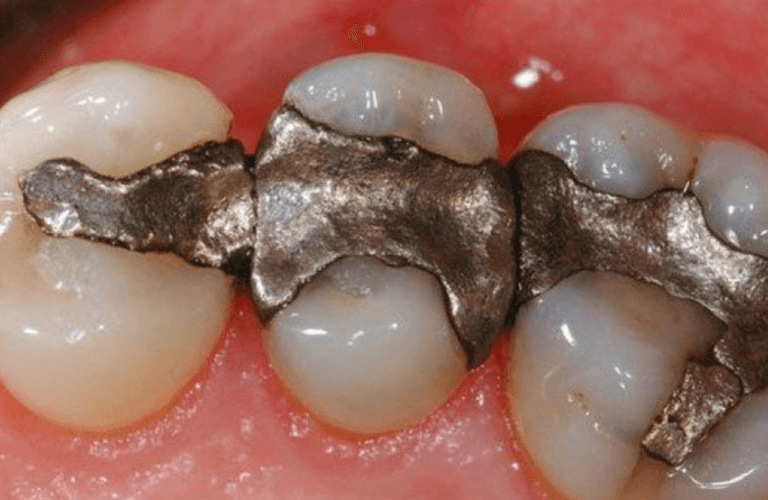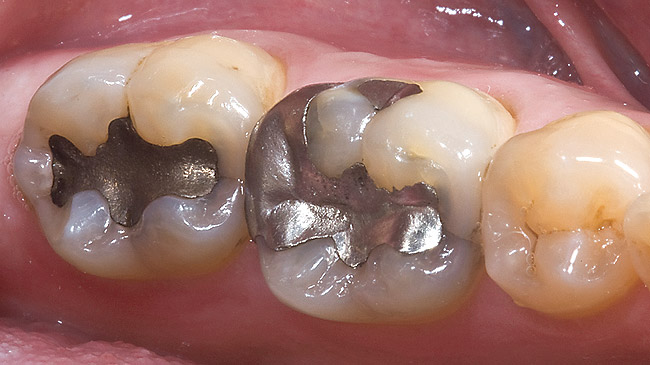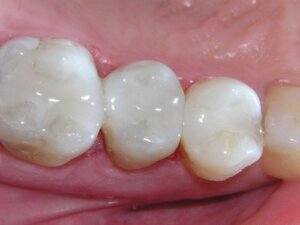SMART Amalgam Removal

What is SMART Amalgam Removal?
Mercury amalgam fillings, also known as silver fillings, have been used in dentistry for decades. However, due to concerns about mercury exposure and its potential health risks, many people are opting to have their amalgam fillings removed and replaced with safer, biocompatible materials.
The Safe Mercury Amalgam Removal Technique (SMART) is a comprehensive protocol designed to safely remove mercury amalgam fillings while minimizing mercury exposure to both patients and dental professionals. This method is endorsed by the International Academy of Oral Medicine and Toxicology (IAOMT).
If you’re considering mercury filling removal, choosing a dentist trained in SMART Amalgam Removal ensures a safer, healthier, and more controlled process. Here’s everything you need to know:
- Who Should Consider SMART Amalgam Removal?
- Benefits Of SMART Amalgam Removal
- Alternatives To Mercury Amalgam Fillings
- How Much Does SMART Amalgam Removal Cost?
- Steps In The SMART Amalgam Removal Procedure
- Frequently Asked Questions About SMART Amalgam Removal
If you have any further questions about SMART Amalgam Removal or other holistic dentistry services offered at Atlas Dental, please contact us.

Free phone consultation
Have questions about mercury filling removal? Schedule a free phone consultation with our Toronto dentist.

5 star google reviews
Our patients love us! See for yourself why more and more people are choosing Atlas Dental for their dental fillings.

Book Emergency tooth filling
Do you think you have a mercury filling emergency and need an appointment? Book an emergency mercury filling removal online.
Who Should Consider SMART Amalgam Removal?
SMART Amalgam Removal may benefit individuals with specific concerns or goals:
- Mercury Concerns: Patients worried about mercury exposure may prefer alternative materials for peace of mind.
- Aesthetic Reasons: Replacing silver-colored amalgam with tooth-colored fillings can improve smile appearance.
- Allergic Reactions: Those with sensitivities to amalgam metals may experience improved comfort with alternatives.
- Worn or Damaged Fillings: Aging or deteriorating amalgam fillings should be replaced to maintain dental health.
- Upgrading to Modern Dental Materials: Newer filling materials offer improved durability and biocompatibility.
- Transitioning to Holistic or Biological Dentistry – Many patients prefer biocompatible, non-toxic dental materials.
Before removing your amalgam fillings, consult a SMART-trained dentist to assess your individual situation. If you have further questions about Mercury Filling Removal, please contact us.

Benefits of SMART Amalgam Removal
Removing mercury fillings using the SMART method comes with several advantages:
- Reduced Mercury Exposure: Amalgam fillings continuously release mercury vapors, which can be absorbed into the body. Using SMART safety measures ensures a safe and controlled extraction process.
- Improved Aesthetics: Replacing silver fillings with tooth-colored composites or ceramic restorations results in a more natural-looking smile.
- Health & Wellness Benefits: Many patients report increased energy, mental clarity, and reduced inflammation after replacing their mercury fillings.
- Stronger and Safer Dental Materials: Modern dental materials, such as composite resin, porcelain, or zirconia, are stronger, durable, and non-toxic, reducing the risk of fractures and further dental complications.
- Preventing Long-Term Dental Issues: Silver fillings expand and contract with temperature changes, which can cause tooth fractures over time. Removing them reduces the risk of cracks and structural damage.
Before making any decisions, it is essential to consult with a SMART-trained biological dentist who can assess your unique dental needs and guide you in selecting the most suitable dental filling materials. If you have further questions about Mercury Filling Removal, please contact us.

Alternatives to Mercury Amalgam Fillings
Several options are available for those looking to replace their amalgam fillings using the SMART method:
- Composite Resin: Tooth-colored and highly durable, composite resin is one of the most popular choices for replacing amalgam fillings. It is strong, durable, mercury-free and biocompatible.
- Porcelain: Porcelain inlays, onlays or crowns are strong and long-lasting, making them ideal for patients looking for a durable and natural-looking option.
- Glass Ionomer: This material releases fluoride over time, helping to protect the tooth from further decay. While not as strong as composite resin, it is an excellent choice for small fillings or patients with special dental needs.
Each amalgam filling alternative comes with its unique advantages and considerations. Your dentist will assess your specific dental needs and discuss the most suitable filling material for your individual case. If you have further questions about SMART amalgam filling removal, please contact us.

Cost of SMART Amalgam Removal
The SMART (Safe Mercury Amalgam Removal Technique) protocol is a specialized process designed to minimize mercury exposure for both patients and dental professionals during the removal of mercury amalgam fillings. Because of the additional safety measures, specialized equipment, and advanced training, it costs more than standard amalgam filling removal. Below you will find general pricing for regular dental fillings. For a quote on SMART mercury filling removal, please contact us.
Routine Dental Fillings cost $207-477 depending on the location of the tooth (anterior, bicuspid or molar), as well as the number of “surfaces” involved. Imagine each tooth as a 5 surface box. Each “surface” of this imaginary box will dictate the size (and cost) of the tooth filling. The codes relevant to regular dental fillings in the Ontario Dental Association’s Suggested Fee Guide appear as follows:
Permanent Anteriors:
- 23111 – One surface: $205
- 23112 – Two surfaces: $256
- 23113 – Three surfaces: $308
- 23114 – Four surfaces: $379
- 23115 – Five surfaces (maximum surfaces per tooth): $400
Permanent Bicuspids:
- 23311 – One surface: $226
- 23312 – Two surfaces: $283
- 23313 – Three surfaces: $339
- 23314 – Four surfaces: $414
- 23315 – Five surfaces or maximum surfaces per tooth: $435
Permanent Molars:
- 23321 – One surface: $246
- 23322 – Two surfaces: $308
- 23323 – Three surfaces: $369
- 23324 – Four surfaces: $451
- 23325 – Five surfaces or maximum surfaces per tooth: $477
Regular Dental Fillings are considered a basic service under all dental insurance plans and should be covered to your maximum insurable limit, but be sure to find out from your dental insurance plan provider how much you are eligible for before going ahead with dental treatment. Our fees are consistent with the ODA Fee Guide.
For patients without dental insurance, Atlas Dental is pleased to offer dental financing through iFinance Dentalcard. Affordable payment plans start at 7.95% for terms of 6 months to 6 years. To learn more about Dentalcard dental treatment financing, follow this link.
Steps In The SMART Amalgam Removal Procedure
Removing mercury fillings using the SMART (Safe Mercury Amalgam Removal Technique) follows a structured process to minimize mercury exposure and ensure patient safety. The procedure includes several key steps:
- Comprehensive Examination: The dentist evaluates the condition of your amalgam fillings and overall oral health, using digital dental X-rays or diagnostic tools to assess the situation fully.
- Treatment Planning: Your dentist will create a treatment plan and recommend alternative filling materials, considering both your health needs and cosmetic preferences.
- Local Anesthesia: The dentist administers anesthesia to numb the treatment area for a pain-free experience.
- Patient Protection: A rubber dam is placed around the tooth to prevent mercury particles and debris from contaminating the rest of the mouth. An external oxygen supply delivered through a nasal mask prevents inhalation of mercury vapor.
- Safe Amalgam Removal: Using the SMART protocol, your dentist will:
-
- Section the filling into smaller pieces to minimize heat and mercury vapor release.
- Use high-volume suction and external air filtration to capture mercury particles.
- Apply continuous water irrigation to prevent overheating and vaporization.
- Ensure proper protective gear for both the patient and dental team.
-
- Tooth Restoration: The cleaned tooth is restored with composite, ceramic, or glass ionomer to maintain function, strength, and aesthetics. The dentist ensures proper alignment and polishes the filling for a smooth finish.
- Post-Procedure Detox Support: Patients may be advised to increase hydration, consume detoxifying foods (chlorella, activated charcoal, vitamin C), and avoid processed foods for a few days.
By following these careful steps, your dentist ensures a safe, effective, and aesthetically pleasing replacement for your old mercury fillings. If you have further questions about SMART mercury filling removal, please contact us.

Frequently Asked Questions About SMART Amalgam Removal
- Is mercury filling removal safe?
Yes, when performed using SMART-trained protocols, mercury exposure is minimized, making it a safe and effective procedure.
- Does mercury filling removal hurt?
The procedure is performed under local anesthesia, ensuring you remain comfortable and pain-free throughout.
- Will replacing amalgam fillings improve my health?
While replacing amalgam fillings can alleviate concerns about mercury exposure, current scientific evidence does not conclusively link amalgam fillings to adverse health effects.
- How long do the new fillings last?
The longevity of new fillings depends on the material used and your oral hygiene habits. Composite fillings can last 5-7 years, while porcelain fillings may last longer with proper care.
Replacing dental amalgam fillings is a personal decision that can enhance both the aesthetics and functionality of your smile. If you have further questions about SMART mercury filling removal, please contact us.

